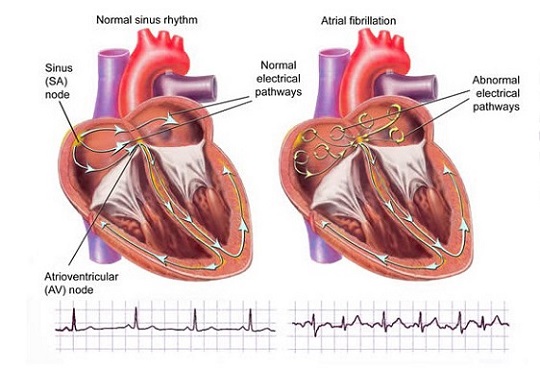Nikhil Prasad Fact checked by:Thailand Medical News Team Jun 04, 2024 1 year, 8 months, 2 weeks, 1 day, 2 hours, 28 minutes ago
Medical News: A recent study conducted by Skylitseio General Hospital of Chios and AHEPA University General Hospital in Thessaloniki, Greece, has brought encouraging news for patients suffering from recent-onset atrial fibrillation (AF). The research that is covered in this
Medical News report, aimed at evaluating the efficacy and safety of intravenous (IV) flecainide combined with oral beta-blockers, offers promising results for the cardioversion of paroxysmal AF, a condition characterized by an irregular and often rapid heart rate.
 New Study Reveals Effective Treatment for Recent-Onset Atrial Fibrillation
Background: Understanding Flecainide and Beta-Blockers
New Study Reveals Effective Treatment for Recent-Onset Atrial Fibrillation
Background: Understanding Flecainide and Beta-Blockers
Flecainide, a Vaughn-Williams Class IC antiarrhythmic agent, is widely recognized for its effectiveness in treating AF. It functions by blocking sodium channels, thereby prolonging the PR interval and widening the QRS complex in the heart. Despite its effectiveness, flecainide can sometimes cause adverse effects such as hypotension and proarrhythmia. To mitigate these risks, this study investigates the combined use of IV flecainide with oral beta-blockers, which are known to enhance the safety and efficacy of flecainide by reducing proarrhythmic events.
Methods: Conducting the Study
Initiated in January 2020 at Skylitseion General Hospital, this single-center registry included patients who received IV flecainide and oral beta-blockers within 48 hours of AF onset. The primary outcome measured was the conversion to sinus rhythm within two hours. A total of 121 patients (73 males and 48 females, with a mean age of 61.4 years) participated in the study. Each patient received an oral dose of a beta-blocker, such as bisoprolol or metoprolol, at least 30 minutes before the flecainide infusion.
Results: Promising Findings
The study revealed that 81.8% of patients successfully converted to sinus rhythm within two hours. The median conversion time was remarkably short, at just 11.7 minutes. Moreover, the duration of hospitalization for successfully cardioverted patients was significantly reduced, averaging 10.9 hours compared to 30.7 hours for those who remained in AF.
No serious adverse events were recorded, highlighting the safety of the combined treatment approach. This study is one of the largest registries to evaluate the effectiveness and safety of IV flecainide co-administered with a beta-blocker for the acute management of recent-onset AF.
Discussion: Comparative Analysis
The study’s findings align with the 2020 European Society of Cardiology (ESC) AF guidelines, which recommend flecainide for the pharmacological cardioversion of recent-onset AF, provided that ischemic or significant heart disease is excluded. Flecainide is known for its high efficacy and rapid action, with conversion rates ranging from 50% to 96% within one hour and a mean conversion time of 30 minutes.
When compared to other antiarrhythmic drugs, IV flecainide outperformed amiodarone, propafenone, pro
cainamide, ibutilide, and dofetilide in terms of both conversion rate and speed. Although vernakalant offers a quick conversion time, flecainide remains more effective and is widely available and cost-effective.
Unique Contributions of This Study
One of the unique aspects of this study is its evaluation of IV flecainide co-administered with a beta-blocker in 100% of patients, a combination not extensively studied before. The high success rate of 81.8% within two hours and the absence of serious adverse events make this combination a superior choice for the cardioversion of paroxysmal AF.
Additionally, the study's findings are particularly relevant in the COVID-19 era, where minimizing hospital stays and resource use is critical. The short conversion time achieved with IV flecainide and beta-blockers could lead to fewer hospital admissions and allow for more efficient management of AF patients in emergency departments.
Conclusion: A Breakthrough in AF Treatment
This study provides robust evidence supporting the combined use of IV flecainide and oral beta-blockers for the rapid and safe cardioversion of recent-onset AF. The high success rate, quick conversion time, and minimal adverse events make this treatment approach highly appealing, especially during the ongoing COVID-19 pandemic.
The results underscore the potential of this combination therapy to improve patient outcomes, reduce hospital stays, and optimize the use of healthcare resources. As such, IV flecainide plus oral beta-blockers could become a new standard in the acute management of paroxysmal AF, offering hope to millions of patients worldwide.
This breakthrough in AF treatment not only enhances the efficacy of cardioversion but also significantly improves patient safety and healthcare efficiency, marking a significant advancement in the field of cardiology.
The study findings were published in the peer reviewed International Journal of Translational Medicine.
https://www.mdpi.com/2673-8937/4/2/21
For the latest on Atrial Fibrillation, keep on logging to Thailand
Medical News.
Read Also:
https://www.thailandmedical.news/news/atrial-fibrillation-significantly-increases-mortality-risk-in-severe-covid-19-cases-
https://www.thailandmedical.news/news/study-finds-that-regular-use-of-fish-oil-supplements-might-be-a-risk-factor-for-atrial-fibrillation-and-stroke
https://www.thailandmedical.news/news/medical-news-researchers-claim-that-fibrinaloid-microclots-could-be-behind-atrial-fibrillation-relevant-for-sars-cov-2-context
https://www.thailandmedical.news/news/covid-19-news-israeli-study-finds-that-sars-cov-2-infections-can-trigger-new-onset-atrial-fibrillation
https://www.thailandmedical.news/news/covid-19-news-israeli-study-finds-that-sars-cov-2-infections-can-trigger-new-onset-atrial-fibrillation
